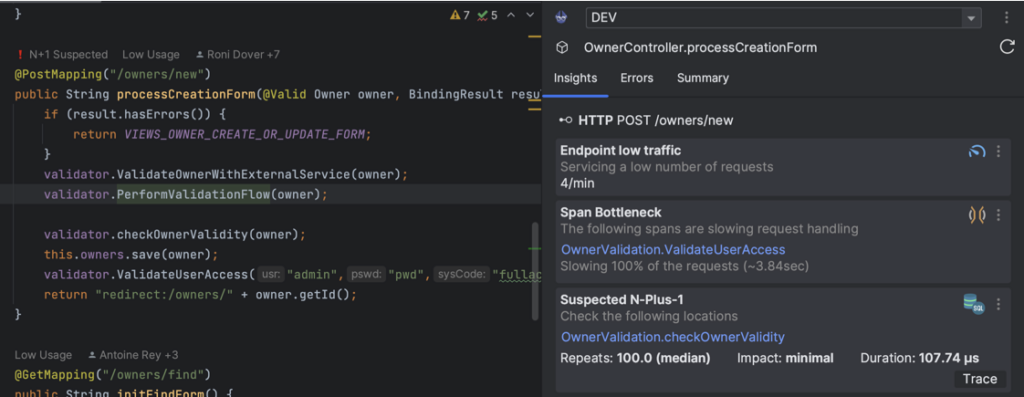
Digma for Teams
Enable your development team to write performant code and catch bugs before they reach your users.
Time-consuming Issues
Issue resolution is time-consuming. Investigation efforts hold back the team, which often results in fixing the wrong problem.
Team Production Struggles
Issues that could have been prevented or identified early are discovered by OPs or customers and continually drag the team’s velocity down.
Costly, Scaling Inefficiencies
It is easy to miss out on low-hanging fruits, bottlenecks, inefficiencies, or overuse of your resources, driving costs up.
With Digma, Developers write Production Ready Code
Digma ensures developers keep their code performant from the start by continuously providing feedback in line with their code across the SDLC.

Identify Issues in the Dev Cycle
Digma instantly detects emerging issues or suspected problems early in the dev test stages and before they impact the end users. This allows the team to handle issues before they become a business crisis.
Identify Issues Root Causes
The Digma Engine continuously analyses your existing application data to detect anti-patterns, query issues, and bottlenecks and identify the root cause.


Optimize the Right Code
Digma measures and scores different areas in the code to identify their impact on performance and costs.
How Digma Works
Digma ensures developers keep their code performant from the start by continuously providing feedback in line with their code across the SDLC.
An IDE Plugin
Digma installs as a standalone IDE marketplace plugin. Running in the development environment.
All data stays local
Digma is not a cloud service and runs either on your laptop or in the safety of your private cloud.
No code changes required
Digma does not require changing your code and has no observability prerequisites. It is also OTEL-compliant!
Feature Comparison

See For Yourself
Book a Demo with the DIGMA team to see how DIGMA can improve your organizational releases
How Is It Different from APMs
Check out our frequently asked questions below for answers to common queries. If you don’t find what you’re looking for, feel free to reach out to our support team for assistance.

Join Our Community
Digma is the first Continuous Feedback platform built with the support of a highly engaged community of developers. Curious about how others are using Digma? Have questions or ideas as you start using it yourself? We’ll see you in there.
